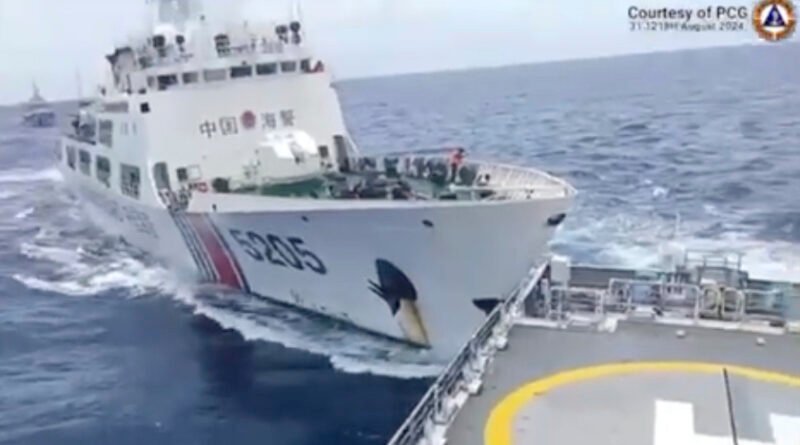US and other countries criticize China following recent collision between Chinese vessel and Philippine ship
The U.S. State Department and ambassadors from the UK, Australia, New Zealand, and Japan have condemned new escalations by Beijing in the South China Sea.
The United States and ambassadors of several other countries have condemned Beijing’s recent aggressive behavior in the South China Sea after its coast guard ship rammed into another Philippine vessel on Saturday.
“A China Coast Guard vessel deliberately collided three times with a Philippine Coast Guard vessel exercising its freedom of navigation in the Philippines’ exclusive economic zone, causing damage to the vessel and jeopardizing the safety of the crew onboard,” he said.
Miller also condemned “a series of dangerous and escalatory actions” by China throughout August, saying the communist regime’s “unlawful claims of ‘territorial sovereignty’ over ocean areas where no land territory exists, and its increasingly aggressive actions to enforce them, threaten the freedoms of navigation and overflight of all nations.”
The latest skirmish between the Chinese regime and the Philippines occurred near the Sabina Shoal, which China refers to as the Xianbin Jiao (Xianbin Reef) and the Filipinos call the Escoda Shoal.
It’s part of the disputed Spratly Islands over which both Beijing and Manila claim sovereignty.
According to the United Nations Convention on the Law of the Sea (UNCLOS), up to 200 nautical miles off the coast of a nation counts as its exclusive economic zone, and the Sabina Shoal—which is much closer to the Philippines than it is to China—falls within the Philippines’s exclusive economic zone.
A 2016 Permanent Court of Arbitration ruling in The Hague also found that the Chinese regime had no legal basis for its territorial claims over the South China Sea. Beijing said the court doesn’t have the power to rule on territorial disputes and passed a domestic law it claims allows its coast guard to detain foreigners it views as trespassers while ramping up aggression in the area.
Beijing and Manila blamed each other on Saturday for the collisions of Chinese Coast Guard vessel 5205 and the Philippines’s BRP Teresa Magbanua.
It’s the fourth sea incident and the third collision incident in a month over which Beijing and Manila publicly traded accusations. Including air incidents makes it the seventh skirmish.
After the collisions, the Chinese regime’s state-owned Global Times cited Chinese experts saying the Philippines is “not concerned about the safety of its ships, aircraft, and personnel at Xianbin Jiao, it only cares about whether its actions in South China Sea can win the ‘support’ of certain external countries.”
U.S. Ambassador to the Phillippines MaryKay Carlson and ambassadors of the United Kingdom, Australia, New Zealand, and Japan voiced their concerns on X over Beijing’s escalations in the South China Sea.
“Repeatedly ramming vessels is unacceptable & dangerous. All countries must comply with international law. The 2016 Arbitral Award is binding on its parties.”
The New Zealand Embassy in Manila published a statement saying the latest incident “is profoundly troubling and fits a recent pattern of dangerous and destabilising actions in the region.”
Japanese Ambassador Endo Kazuya said that Japan, as a stakeholder of the South China Sea, is “seriously concerned over the repeated incidents.”
Japan “opposes any unilateral attempts to change the status quo by force or coercion [and] stands together with [the Philippines] by upholding rule of law at sea,” Kazuya added.




